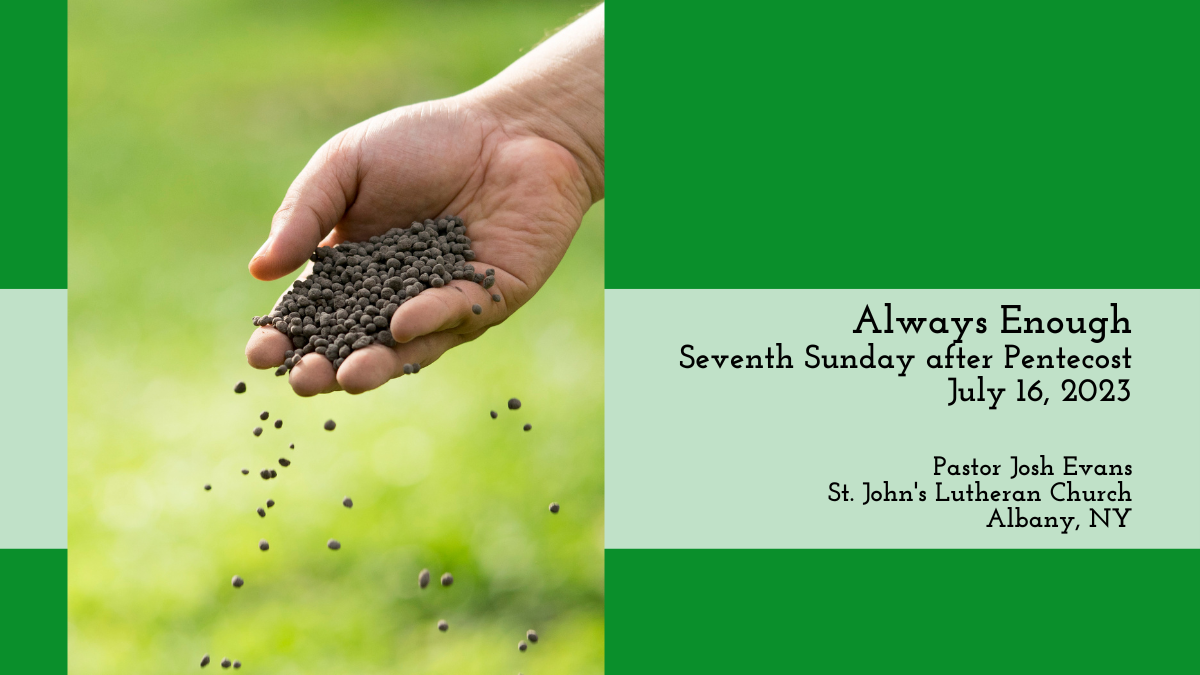St. John’s Lutheran Church
16 July 2023 + Lectionary 15a (7 Pentecost)
Matthew 13.1-9, 18-23
Rev. Josh Evans
I am, by all accounts and evidence, a city person. I have never lived, nor do I have any desire to live, on a farm. Really, I don’t even like camping.
Don’t get me wrong: That’s no diss to country people. There are plenty of folks for whom such an agrarian life is incredibly fulfilling, idyllic even, and without them, I wouldn’t get to enjoy most of the delicious food I eat every day.
But me: I like my late-night food delivery. I like having more than one choice of a downtown coffee shop or bar. I like the convenience of having virtually anything I could possibly need or want just a short car or bus ride away. I even like the familiarity of light pollution casting its soft glow against the night sky.
Not to mention the fact that I would be 100% useless on a farm. I’m not exactly what you would describe as “at one with nature.”
My last two remaining house plants were spared an almost certain death when I handed them off to a friend in Illinois before moving to New York. I have even been known to kill plants described as “impossible to kill.” Can you imagine me with crops?!
So it’s really no surprise that I feel completely lost in the midst of Jesus’s farming and gardening parables.
Add to that that it’s generally not that difficult to feel completely lost in any of Jesus’s parables, regardless of the subject matter, and the task of interpretation seems nearly impossible.
In the first place, Jesus’s original context is not our own. A parable about a sower sowing seed isn’t going to land with most of us in quite the same way. Truthfully, it might not have even landed for all of Jesus’s original hearers.
That’s the beauty of the parables: Jesus employed a variety of illustrations throughout his stories because he knew his hearers came from a variety of backgrounds – just as this assembly, too, comes from a variety of backgrounds. There is no one-size-fits-all parable, nor is there any one-size-fits-all sermon. Some stories will speak to us more deeply than others, and that’s okay.
Secondly, we also have this urge as modern readers of scripture to want to assign neatly defined roles to the cast of characters in the parable: The sower is God, the seeds are God’s word, and the different terrains on which the seeds fall are different groups of people.
Which then spirals rather quickly into a not-so-fun game of “Which terrain am I?” And all of a sudden, we’ve made this parable all about us.
From there, it’s not a far ride to shame and judgment, as we begin to re-evaluate our prayer lives and spirituality.
We worry if maybe we are the hard path, the rocky ground, or the choking thorns. We hyper-fixate on whether we’re “good” enough, or praying enough, or reading our devotions enough.
We feel guilty when our faith life doesn’t measure up to the imaginary yard stick we’ve set up for ourselves, especially when compared to other people.
Yet, when we manage to make the parable all about us, or worse yet, about shame and judgment, there is no good news – no God-action – in that.
And we also miss the point.
This isn’t the “Parable of the Four Terrains.” It’s the “Parable of the Sower.” It is, in the words of Debie Thomas, “a parable about the nature and character of God. About God’s kingdom, God’s provision, and God’s extravagant generosity when it comes to us, his beloved creations.”
In Jesus’s parable, the sower goes out to sow – everywhere. The sower doesn’t carefully evaluate the land first to find the most “ideal” place to plant. They just sow. Abundantly. Indiscriminately. Extravagantly. Perhaps even wastefully.
The sower also doesn’t stick around after the fact to see what happens to the seeds they planted. It’s almost like the sower doesn’t care …
… or maybe, more accurately, the sower knows, deep down, that what needs to flourish will flourish – just perhaps not all at once or everywhere. Some seeds take a little longer to sprout and grow.
Perhaps more importantly, the sower’s indiscriminate and extravagant sowing leads us to believe the sower isn’t concerned about running out of seed. There’s enough to go around, even enough to “waste.” It’s not going to run out.
There’s a reason so many of Jesus’s parables begin, “The kingdom of heaven (or God) is like…” This is a vision for the church!
And it’s an invitation to follow in the example of our Sower God, whose grace cannot be owned or contained, whose mercy never runs out, and whose love is extravagant enough that we need not concern ourselves with “wasting” it or who “deserves” it.
***
At the end of the day, whether the farming imagery of this parables speaks to us or not, the truth of the gospel is for all of us (even us city folk):
A sower goes out to sow, and whatever terrain we find ourselves on, that seed will find its way to us.
Said a little differently, to paraphrase the welcome statement from my home congregation:
Whoever you are, wherever you are from, whatever your background or identity: God’s love is for you.
And there will always be enough.


